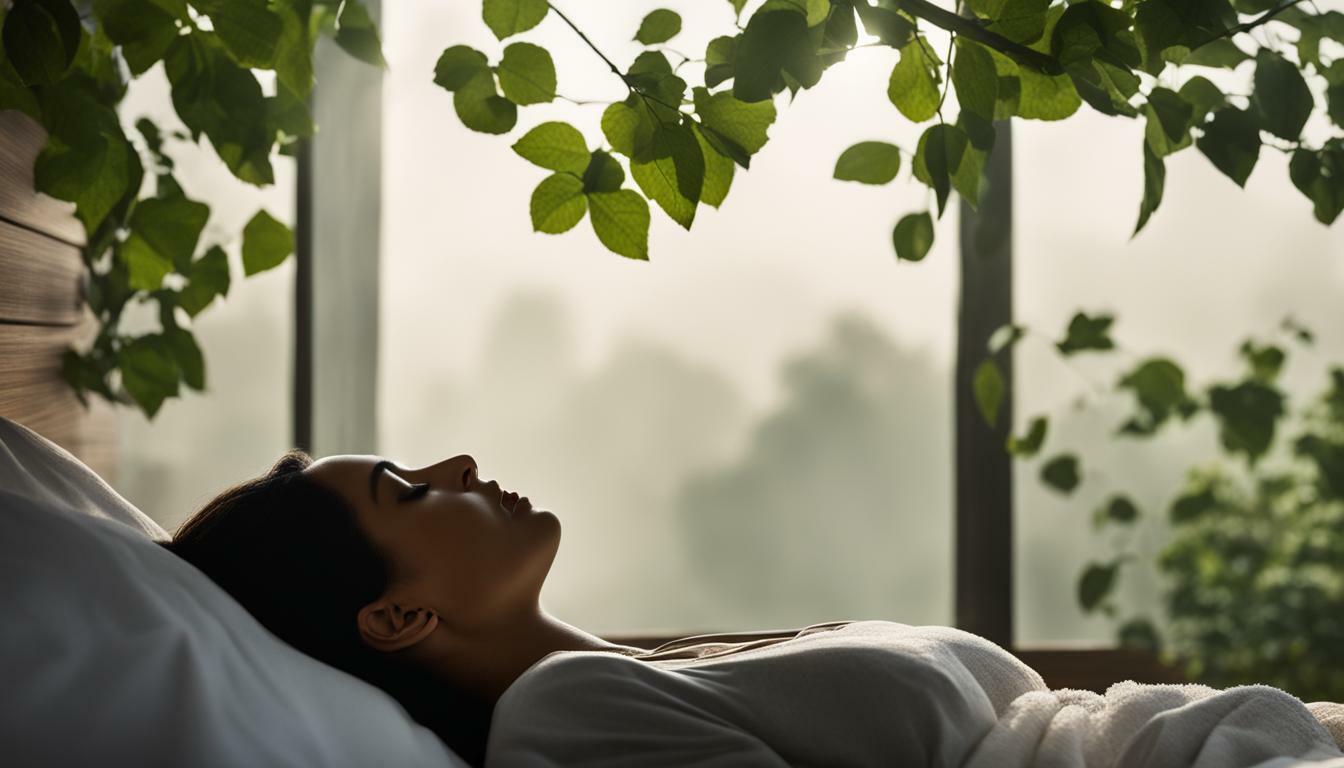Sleep is a complex process that is essential for our physical and mental health. During sleep, the brain undergoes a series of activities that help to restore and rejuvenate the body. Sleep is also important for memory consolidation, learning, and emotional regulation.
There are two main types of sleep: rapid eye movement (REM) sleep and non-REM (NREM) sleep. REM sleep is characterized by rapid eye movements, vivid dreaming, and muscle paralysis. NREM sleep is further divided into four stages, with each stage characterized by different brain wave patterns.

Table of Contents
Circadian Rhythms and Sleep-Wake Cycle
The sleep-wake cycle is regulated by our internal biological clock, also known as the circadian rhythm. This clock is located in a part of the brain called the suprachiasmatic nucleus (SCN). The SCN receives input from the eyes, which helps to synchronize the clock with the natural light-dark cycle.
The circadian rhythm regulates the production of a hormone called melatonin, which helps to promote sleepiness. Melatonin production is highest at night and lowest during the day.
Exposure to natural light during the day helps to regulate the circadian rhythm and promote wakefulness. However, exposure to blue light from electronic devices at night can disrupt the circadian rhythm and interfere with sleep.
Common Hindrances to Natural Sleep Remedies

If you’re struggling to get a good night’s sleep despite trying natural sleep remedies, there may be some common hindrances that are preventing you from achieving the desired results. Here are two common hindrances that you should be aware of:
Influence of Diet and Substances
Your diet and substances that you consume can have a significant impact on your ability to fall asleep and stay asleep. Caffeine, for example, is a stimulant that can keep you awake for hours. If you’re consuming caffeine in the afternoon or evening, it may be interfering with your ability to get a good night’s sleep. Alcohol, on the other hand, may help you fall asleep faster, but it can also disrupt your sleep later in the night, leading to poor sleep quality.
To avoid these hindrances, you should be mindful of what you’re consuming and when. Try to limit caffeine intake to the morning hours, and avoid consuming alcohol close to bedtime. Additionally, try to eat a healthy and balanced diet, as this can help regulate your sleep patterns.
Impact of Stress and Mental Health
Stress and mental health issues such as anxiety and depression can also interfere with your ability to sleep. When you’re stressed or anxious, your body releases cortisol, a hormone that can keep you awake and alert. Similarly, depression can disrupt your sleep patterns, leading to insomnia or poor sleep quality.
To combat these hindrances, it’s important to practice good sleep hygiene and manage stress levels. Try to establish a regular sleep routine, avoid screens before bedtime, and create a relaxing sleep environment. Additionally, consider seeking professional help if you’re experiencing chronic stress, anxiety, or depression that is impacting your sleep.
By addressing these common hindrances, you can improve your chances of achieving a good night’s sleep with natural remedies.
Evaluating Natural Sleep Aids
If you’re struggling with sleep, you may have tried a variety of natural sleep aids. However, not all natural sleep remedies are created equal. Before you give up on natural remedies altogether, it’s important to evaluate the options available to you.
Herbal Supplements and Their Efficacy
Herbal supplements such as chamomile, valerian, and lavender are often touted as natural sleep aids. While some studies have shown that these herbs may have a mild sedative effect, the evidence is not conclusive. It’s important to keep in mind that herbal supplements are not regulated by the FDA, so the quality and potency of these products can vary widely.
Melatonin is another popular natural sleep aid. It is a hormone that regulates sleep-wake cycles and is naturally produced by the body. Melatonin supplements are available over-the-counter and have been shown to be effective in some cases. However, it’s important to talk to your doctor before taking melatonin, especially if you are taking any medications.
Safety and Side Effects of Natural Sleep Aids
While natural sleep aids may seem like a safer alternative to prescription sleep medications, they can still have side effects. For example, valerian root can cause headaches, dizziness, and upset stomach. Chamomile can cause allergic reactions in some people. Lavender oil can cause skin irritation and should not be ingested.
It’s also important to keep in mind that natural sleep aids can interact with other medications you may be taking. For example, melatonin can interact with blood thinners, antidepressants, and other medications.
Lifestyle Factors Affecting Sleep Quality
When it comes to getting a good night’s sleep, lifestyle factors play a crucial role. Here are some key lifestyle factors that can affect your sleep quality:
Exercise and Physical Activity
Regular exercise can help you fall asleep faster and enjoy deeper sleep. However, exercising too close to bedtime can actually have the opposite effect, making it harder to fall asleep. It’s best to finish your workout at least a few hours before bedtime to allow your body to wind down.
Sleep Hygiene and Environment
Your sleep hygiene and environment can also have a big impact on your sleep quality. Here are a few tips to improve your sleep hygiene and environment:
- Keep your bedroom cool, quiet, and dark to promote a restful sleep environment.
- Avoid using electronic devices in bed, as the blue light emitted by these devices can suppress the production of melatonin, a hormone that regulates sleep.
- Stick to a consistent sleep schedule, even on weekends, to help regulate your body’s natural sleep-wake cycle.
- Avoid consuming caffeine and alcohol close to bedtime, as these substances can interfere with sleep quality.
By paying attention to these lifestyle factors, you can help improve your sleep quality and enjoy a more restful night’s sleep.
Special Considerations in Sleep Health
Sleep Disorders and Chronic Conditions
If you suffer from a sleep disorder or chronic condition, it may be more difficult for you to find relief from insomnia using natural sleep remedies. Sleep disorders such as sleep apnea, restless leg syndrome, and narcolepsy can disrupt your sleep and make it harder to fall and stay asleep. Chronic conditions such as pain, diabetes, and high blood pressure can also interfere with your sleep.
If you have a sleep disorder or chronic condition, it is important to work with your healthcare provider to manage your symptoms. Your provider may recommend lifestyle changes, medications, or other treatments to help you manage your condition and improve your sleep.
Life Stages and Hormonal Changes
Certain life stages and hormonal changes can also affect your sleep and make it harder to find relief from insomnia using natural sleep remedies. Women going through menopause may experience hot flashes, night sweats, and other symptoms that can disrupt their sleep. Older adults may have trouble falling and staying asleep due to changes in their sleep patterns and hormonal changes.
If you are pregnant, you may also experience changes in your sleep patterns and hormonal changes that can make it harder to find relief from insomnia using natural sleep remedies. It is important to talk to your healthcare provider about your sleep and any concerns you may have about your sleep during pregnancy.
Optimizing Natural Sleep Remedy Usage
If you’re struggling with sleep and have tried natural remedies without success, there are a few things you can do to optimize your usage.
Correct Dosages and Timing
One of the most important things to consider when using natural sleep remedies is the correct dosage and timing. It’s essential to follow the recommended dosage on the label, and not to exceed it. Taking too much of a supplement can lead to adverse effects, including drowsiness, headaches, and nausea.
Additionally, timing is crucial when it comes to natural sleep remedies. For instance, melatonin supplements should be taken around 30 minutes before bed to optimize their effects. Chamomile tea and tart cherry juice can be consumed in the evening to promote relaxation and better sleep.
Integrating Multiple Approaches
While natural sleep remedies can be effective, it’s important to remember that they’re just one piece of the puzzle. Integrating multiple approaches can help you achieve better sleep. For example, relaxation techniques, such as deep breathing and meditation, can help calm your mind and prepare you for sleep.
Another approach is to incorporate sleep-promoting supplements, such as magnesium, into your routine. Magnesium is a mineral that aids in relaxation and can improve sleep quality. It’s essential to consult with your healthcare provider before taking any supplements to ensure they’re safe and appropriate for you.
Frequently Asked Questions
What factors could be diminishing the effectiveness of natural sleep remedies?
There are several factors that could be impacting the effectiveness of natural sleep remedies. These include your overall health, medication use, and lifestyle habits. If you have an underlying medical condition, it is important to speak with your healthcare provider before using any natural sleep aids.
Additionally, certain medications can interfere with the effectiveness of natural remedies, so it is important to check with your doctor or pharmacist before combining any medications. Lifestyle habits such as caffeine intake, alcohol consumption, and exercise can also impact the effectiveness of natural sleep remedies.
How does anxiety impact the efficacy of natural sleep aids?
Anxiety can have a significant impact on the efficacy of natural sleep aids. Anxiety is a common cause of insomnia, and if left untreated, can interfere with the effectiveness of natural remedies.
If you are experiencing anxiety, it is important to address it with your healthcare provider. They can help you develop a treatment plan that may include natural remedies as well as other interventions.
Are there common mistakes people make when using home remedies for insomnia?
Yes, there are several common mistakes people make when using home remedies for insomnia. One of the most common mistakes is not giving the remedy enough time to work.
Natural remedies can take several weeks to start working, so it is important to be patient and consistent in your use of them. Another common mistake is not following the instructions for use. It is important to follow the recommended dosages and instructions for use to ensure the remedy is effective and safe.
Why might a natural sleep aid work for some but not for others?
Natural sleep aids may work differently for different people. This could be due to differences in overall health, medication use, lifestyle habits, or other factors. Additionally, some natural remedies may work better for certain types of insomnia than others. It is important to work with your healthcare provider to find the best natural sleep aid for your individual needs.
Could underlying health issues affect the success of natural remedies for deep sleep?
Yes, underlying health issues can affect the success of natural remedies for deep sleep. If you have an underlying medical condition, it is important to speak with your healthcare provider before using any natural sleep aids. Additionally, some natural remedies may interact with certain medications, so it is important to check with your doctor or pharmacist before combining any medications.
What are the best practices for using natural sleep aids in the elderly?
The elderly may be more sensitive to the effects of natural sleep aids, so it is important to use them with caution. It is important to start with a low dose and gradually increase as needed. Additionally, it is important to monitor for any side effects or adverse reactions. If you have any concerns, it is important to speak with your healthcare provider.


